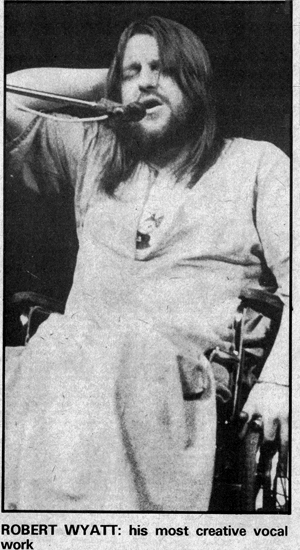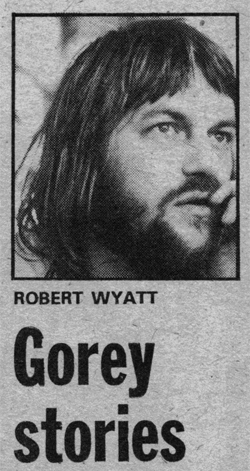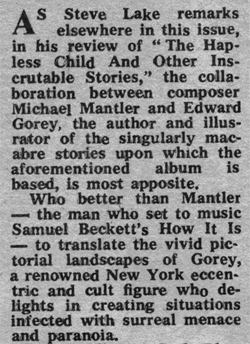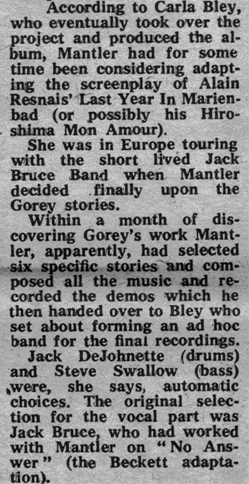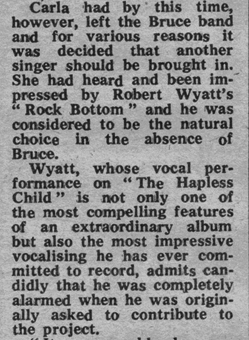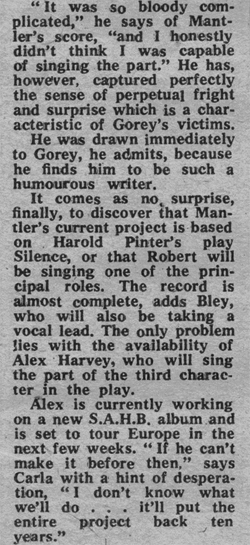| |
|
|
 Mantler paints it black + Gorey stories - Melody Maker - April 17, 1976 Mantler paints it black + Gorey stories - Melody Maker - April 17, 1976
MICHAEL MANTLER/EDWARD GOREY: "The Hapless Child And Other Inscrutable Stories " (Watt Records).
Music by Michael Mantler, words by Edward Gorey, with Robert Wyatt (vocals), Carla Bley (piano,clavinet, string synthesizer), Terje Rypdal (guitar), Steve Swallow (bass), Jack DeJohnette (drums). Produced by Carla Bley.
EDWARD GOREY is a New York cult figure, a 50-year-old eccentric wrapped in fur coats who specialises in desperately grim illustrated novels, mostly set in slightly surreal Victorian scenarios - genteel English landscapes where all ought to be well, but, where terrible things tend to happen to the noblest of families.
Michael Mantler is an ex-Cecil Taylor trumpeter turned composer who is married to Carla Bley. Together they run Watt Records. Now, all of Mantler's pieces have been distinguished by a harrowing bleakness. Pastel colours, it seems, don't figure in his palette. His favourites are apparently, dark red, grey and black.
One of Mantler's passions is creating a contemporary impressionist music to convey the nature of particular literary artists. Already, he's covered Samuel Beckett on " No Answer" (with some success) and is currently dealing with Harold Pinter. But a Mantler-Gorey collaboration seems singularly apposite. Since each is as miserable as the other, the resultant album plumbs new gloomy depths. I suppose it's a telling comment on my own character that I like " The Hapless Child" very much.
Some story synopses are required. The title tracks tells the tale of a child called Charlotte Sophia, whose mother, believing her husband killed in action in Africa, dies of a broken heart. Charlotte is put into a boarding school where she's punished for things she hasn't 'done. Her favourite doll is torn limb from limb. She runs away, collapses on the street, is robbed and sold into the service of a drunken brute who forces her to make artificial flowers in a dark basement. Her eyesight fails. The brute goes mad. Charlotte runs out into the street where she is struck down by a car driven by her own father, who has returned from Africa, not dead after all. The child dies in his arms.
Heart-rending stuff, you'll agree, though not as terrifying as the story of Millicent Frastley, an unfortunate little girl sacrificed to "The Insect God." Or as mysterious as " The Sinking Spell," an enigmatic visitation that sinks from the heavens. The only light relief, of sorts, is found in " The Doubtful Guest " - the adventures of a rather engaging, plimsolled monster who attaches himself to a family and wreaks mild havoc. Since all the lyric matter is comprised of complete Gorey stories, some written in verse form, some not, a singer of very special talents is required, and Robert Wyatt, it must be said, does amazingly well with material that, to me, still looks completely impossible to sing. I might even go as far as to claim this as the most creative vocalising Wyatt has yet put on record - and that, as you know, is saying much. But it isn't just the dexterity with which he sings, or the brilliant voice overlaps on, say, " The Object-Lesson," it's also the very naturalness of his singing that makes him the perfect choice here. Robert's voice, with lisp and accent intact in their transference to song, doesn't employ the usual mannerisms that are supposed to convey emotion in rock music. And nasty stories delivered completely dispassionately are the most unsettling nasty stories of all, believe me.
Meanwhile, Terge Rypdal's guitar, which is concerned almost exclusively - with conveying choked emotion (at least in the context of his own albums) rambles throughout "The Hapless Child" like a chorus of women wailing on the edge of hysteria. And obviously the rhythm tracks laid down by Bley, Swallow and the ridiculously accomplished DeJohnette, are thoroughly sound. Add up those factors and " The Hapless Child" emerges as an extremely impressive album, probably an important one. At the same time, it's scarcely a record to play at parties. Music by, and for, depressives. There are probably enough of us around to put " The Hapless Child " in the chart.
S.L.
|
AS Steve Lake remarks elsewhere in this issue, in his review of " The Hapless Child And Other Inscrutable Stories," the collaboration between composer Michael Mantler and Edward Gorey, the author and illustrator of the singularly macabre stories upon which the aforementioned album is based, is most apposite.
Who better than Mantler - the man who set to music Samuel Beckett's How It Is - to translate the vivid pictorial landscapes of Gorey, a renowned New York eccentric and cult figure who delights in creating situations infected with surreal menace and paranoia.
According to Carla Bley, who eventually took over the project and produced the album, Manlier had for some time been considering adapting the screenplay of Alain Resnais' Last Year In Marienbad (or possibly his Hiroshima Mon Amour).
She was In Europe touring with the short lived Jack Bruce Band when Mantler decided finally upon the Gorey stories.
Within a month of discovering Gorey's work Mantler apparently, had selected six specific stories and composed all the music and recorded the demos which he then handed over to Bley who set about forming an ad hoc band for the final recordings.
Jack DeJohnette (drums) and Steve Swallow (bass) were she says, automatic choices. The original selection for the vocal part was Jack Bruce, who had worked with Manlier on " No Answer " (the Beckett adaptation).
Carla had by this time however, left the Bruce band and for various reasons it was decided that another singer should be brought in. She had heard and been impressed by Robert Wyatt's " Rock Bottom " and he was considered to be the natural choice in the absence of Bruce.
Wyatt, whose vocal performance on " The Hapless Child" is not only one of the most compelling features of an extraordinary album but also the most impressive vocalising he has ever committed to record, admits candidly that he was completely alarmed when he was originally asked to contribute to the project.
" It was so bloody complicated," he says of Mantler's score, "and I honestly didn't think I was capable of singing the part." He has, however, captured perfectly the sense of perpetual fright and surprise which is a characteristic of Gorey's victims.
He was drawn immediately to Gorey, he admits, because he finds him to be such a humourous writer.
It comes as no surprise, finally, to discover that Mantler's current project is based on Harold Pinter's play Silence, or that Robert will be singing one of the principal roles. The record is almost complete, adds Bley, who will also be taking a vocal lead. The only problem
lies with the availability of Alex Harvey, who will sing the part of the third character in the play.
Alex is currently working on a new S.A.H.B. album and is set to tour Europe in the next few weeks. " If he can't make it before then," says Carla with a hint of desperation, "I don't know what we'll do ... it'll put the entire project back ten years."
|
|




